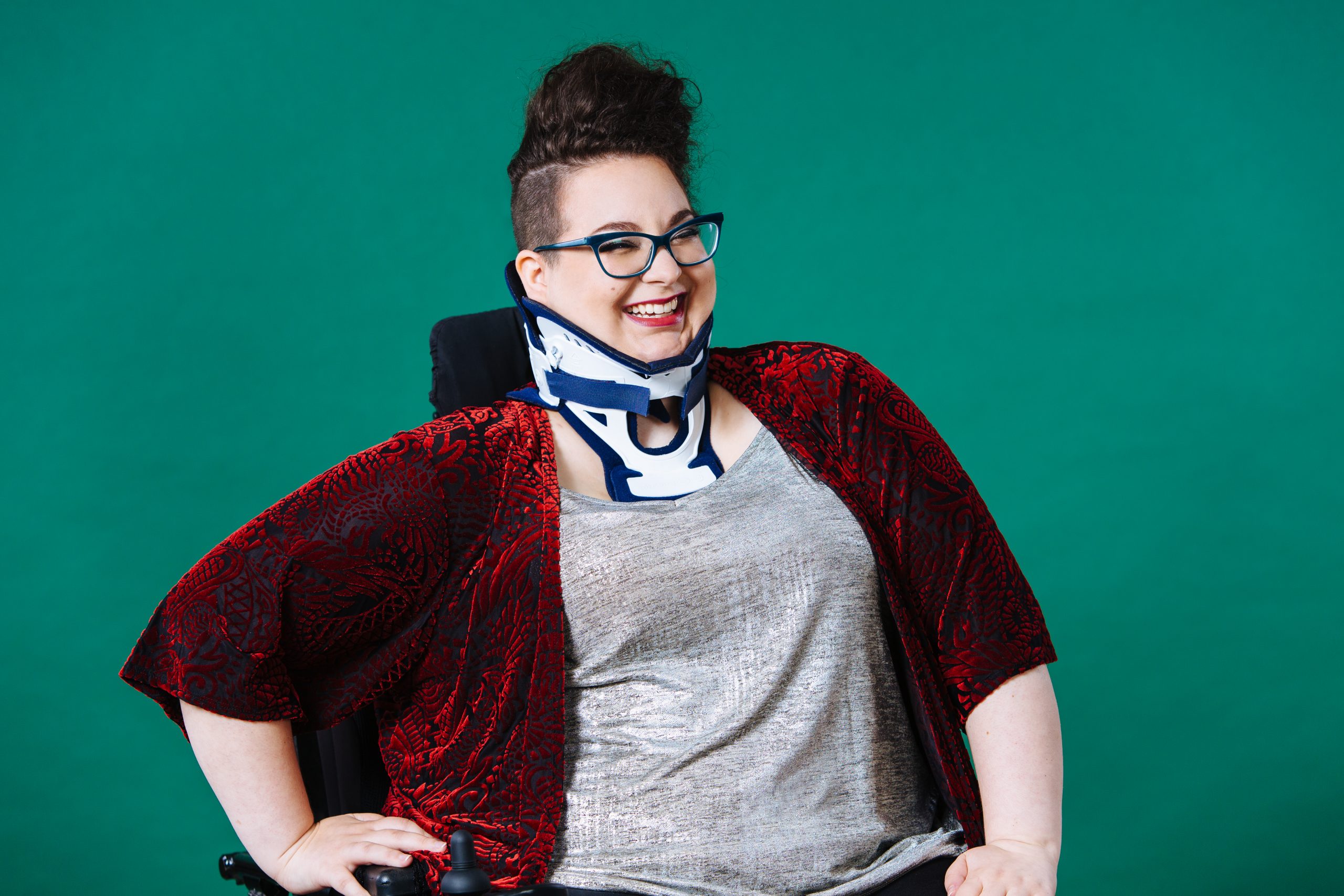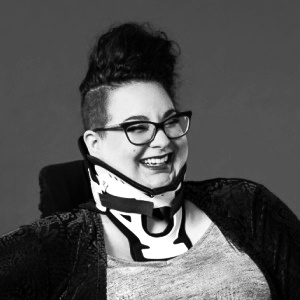A Different Kind of Hustle
In 2015, I opened a package containing my first neck brace. Propped up by pillows in bed, I put it on and realized that with its support I could sing – something I hadn’t been able to do for years. Immediately, I felt all of my hopes and dreams of performing rush in, only to realize, a moment later, that there were no characters who wore neck braces. No one would cast me.
I fell in love with theatre when I was 3 years old, at a production of Beauty and the Beast. I saw the magical, swirling, dancing plates and utensils in the giant wardrobe and told my parents that’s what I wanted to do. They chuckled, gave me a pat on the head, and said, “That’s nice, sweetie.”

Calof as a child, practicing piano. Photo courtesy Ophira Calof.
But I was persistent. By the time I hit my preteens, I was a full blown theatre kid. I inhaled stories like they were candy and worked hard to develop my skills to bring them to life. Voice, piano, drama, dance — I did my homework in the car rides to and from rehearsal, and propelled myself through long hours of extracurriculars with sheer force of will, fruit-to-go bars, and the feeling of being part of something bigger than I could ever be alone.
Later in life, when I became intimately acquainted with chronic illness and disability, I realized that out of all those stories I had devoured, none of them prepared me for my experience. I had only learned of sickness as a plot device, one that ended in death or a cure. I didn’t know that I could experience symptoms that would stay. That I could float through the medical system, undiagnosed, for years. That I could live a full life and also be ill. I knew nothing of life as a Disabled person.
By the time I got my neck brace and put it on, the realization that I didn’t fit the mold of existing characters didn’t crush me. I wanted to be a part of telling the stories that I was missing. Stories like mine.

Calof in Literally Titanium. Photo courtesy Next Stage Festival.
As I started to create and perform again, I knew that I’d face barriers in physical accessibility. Once I started using a wheelchair, I quickly learned that so many theatre spaces are up or down a flight of stairs, and there are often no ramps onto elevated stages.
I also knew that I’d face barriers from stigma. With such minimal and flawed representation of disability in existence, after performances I’m still often asked if my wheelchair and brace are props. I can feel the discomfort, the tension when I arrive on stage, and I’m constantly relearning how to manage those feelings.
What took me longer to realize, and what has been a lot harder for me to accept, is that I would also face barriers in-process.
New stories require a new framework.
In the waiting area of my voice studio growing up, there was a sign that read, “Success is 1 percent talent and 99 percent hard work.” I took that message to heart. I never missed a lesson. I was always prepared with my lines memorized and I worked as long as my teacher, coach, or director asked me to, occasionally pushing through full 10-15 hour rehearsal days.
To me, that was what being an artist meant. It was the mark of commitment. Of work ethic. Of my value as a professional.
So, when I started to develop pain, fatigue, weakness, and a loss of mobility, I tried to push through. I invested in dry shampoo, uber eats, and caffeinated chocolates. In a year-long training program that met once a week, I only missed one class in the whole year. I missed it because I was in the midst of a 13 day hospital stay, after getting dizzy and disoriented and falling off a stage mid-performance.

Ophira performing in A Night for MuSic, age 16. Photo courtesy Ophira Calof.
It turns out that pushing through isn’t sustainable.
It doesn’t fit with disability or chronic illness. It doesn’t fit with so many people’s reality, and certainly not with mine. I have limits. I need to rest, and to carefully plan and parcel out my energy.
What’s more, my needs are constantly in flux. One day I might be able to handle loud noises or bright lights, and the next they might disorient me. One night I might be fine with 7 hours of sleep, and the next I might not be able to get out of bed all day. I can have my lines fully memorized, but then a day with bad brain fog rolls in and I can barely remember my own phone number, never mind a script.
If I can’t always hustle, grind, or push through the way I was taught, then how can I be an artist? Where is my value as a professional?
These are the questions that the Literally Titanium team are working to answer as we build and present the show. Literally Titanium is written from my body’s point of view, giving it the chance to take up space and air out its feelings. Throughout its development, we’ve kept a key question in mind: what does it mean to create a performance that truly works for a Disabled body, on its terms?

In rehearsal for Literally Titanium. Photo courtesy Next Stage Festival.
We’ve centred our process around the phrase #CripTheScript. To us, this means to challenge, reframe, and reclaim language, systems, stories and stages to centre ‘Crip,’ or disability, identities and experiences.
At every rehearsal we check in with each other, and make a plan according to how we’re each feeling that day. We build in breaks that often feature snacks and a lot of crying-from-laughing, while our director, Sanja Vodovnik, stretches on a yoga mat beside my tilted back wheelchair, and our stage manager Connor Low keeps track of our goals of the day. We’ve scheduled extra rehearsal times so that if any of us needs to cancel, we can easily do so; and when snow makes transit difficult, we sometimes move rehearsals to my apartment.
On the production side, I’m lucky enough to be working with the talented powerhouses that are Alia Rasul and Sabrina Friedman. Throughout the last few months leading up to the show, we’ve each taken turns stepping in when one of us hits our capacity, dividing up the work and supporting each other through the process.
The script itself, developed with Jess Watkin as the show’s dramaturg over laughter, tea, and wheels of brie, has rest periods written in, to grab water, catch my breath, or tilt back in my chair. I’ll even have ice on stage with me, in case I need it amidst the whirl of adrenaline that comes with performing and belting out 80s songs.
When I applied to be part of the Next Stage Festival, I wrote that I hoped to create a disability centered space within a theatre festival. It’s been so exciting to work with the Fringe team to #CripTheScript of the audience experience. Every performance will feature a relaxed environment with patrons welcome to move around and come and go from the space as needed. Some performances are framed as a standard relaxed performance with the house lights staying dimly on throughout and patrons invited to make noise and use any handheld devices or fidgets as needed, and some as a modified relaxed performance featuring a less stimulating sensory environment with darker lighting in the audience. We’re working with Akiva Blaine as the Deaf community consultant for our ASL Interpreted Performance, and will be offering two audio described performances as well.
Our goal is to create multiple show environments that can be safe and fun for more people. To build a production that embraces an audience that traditionally hasn’t been considered and allows me, a Disabled and chronically ill person, to perform without harming myself.

Ophira performing in the Sick + Twisted Cabaret in Winnipeg, 2019.
Creating through this process has been a bit of a revelation. We’ve discovered that our framework isn’t a hinderance. It isn’t a lesser version of production. By making space for each member of the team to work in a way that suits us, we’ve each been able to bring our whole, artistic, selves to the process. Rehearsals have felt like magic — like the magic that first drew me to theatre.
When I saw Beauty and the Beast all those years ago, I didn’t fall in love with sitting in a hard seat for an hour. I wasn’t thinking about how those dancer’s muscles must be aching, or any notion of suffering for art.
I fell in love with the story, with the way everything connected together on stage to support it, from the lights to the costumes, set, music, choreography, and performers.
Through becoming a part of the disability community, I have learned the word “interdependent.” As much as society is structured to value how much each of us can do as an independent individual, none of our actions exist in isolation. We all have things to give, and we all have things we need. We are all interdependent.
I need support. I need rest. I need my neck brace and my wheelchair.
And I have one hell of a story to share.
I’d love to share it with you.









Comments